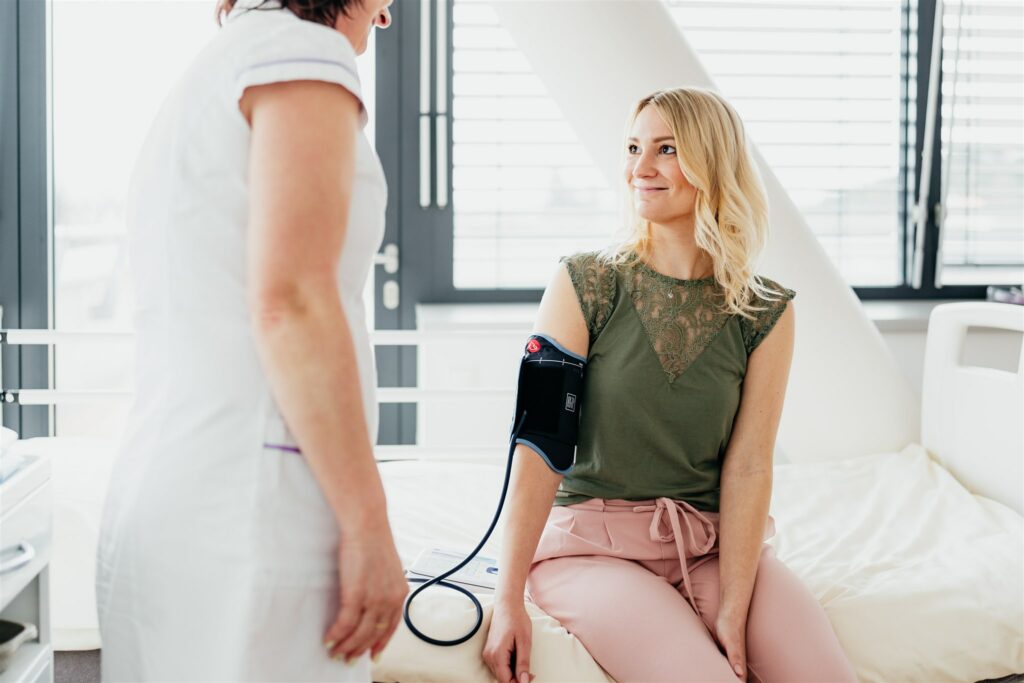Trying to have a baby can be a beautiful but also mentally very challenging time. Especially if it is not going well for a long time. What can you do to get the baby you want as soon as possible? Find out when your fertile days are, bet on a healthy lifestyle and don’t be afraid to turn to experts.
What are the chances that you will actually get pregnant the first time you try?
Getting pregnant can be a more complicated process than it may seem. A healthy couple has about a 20 % to 25 % chance of getting pregnant each menstrual cycle. This means that even with optimal conditions and proper timing, it may take several attempts before your efforts to have a baby are successful and you can celebrate a successful conception.
Tips for getting pregnant as quickly as possible
Although we can’t always have everything right away as we would like, we can at least help. Here are some tips to maximize your chances of getting pregnant.
Ovulation and fertile days
Knowing when you ovulate and therefore when your fertile days are is key to success when planning for a baby. You can use basal temperature measurement, vaginal mucus monitoring or preferably ovulation tests. It is these that will best help determine the best time for conception.
Healthy nutrition and diet
A balanced diet rich in vitamins and minerals can also support your fertility. Focus on foods that are rich in iron, calcium, omega-3 fatty acids and B vitamins. Iron is found mainly in red meat, legumes, leafy greens and dried fruit. Calcium is found in dairy products, leafy greens and tofu. Omega-3 fatty acids are found in oily fish such as salmon, mackerel and sardines. Flax, chia or hemp seeds and nuts are also rich sources. B vitamins can be found in legumes, cereals, dark green vegetables or in citrus fruits and bananas. However, folic acid (B9) should be supplemented in an active form when planning to have a baby, as it is very difficult to get enough from the diet.
Healthy lifestyle
Maintaining a healthy lifestyle, including regular exercise, is another important thing that helps increase the chances of conception. When you add to that limiting or better still completely skipping alcohol, drugs and smoking, you’re on the right track. Sauna bathing is also often counted among the health-giving hobbies. But men planning to have children should skip that. The high temperatures cause the testicles to become too hot and therefore the sperm to mature incorrectly. Wearing tight underwear or tight jeans can have a similar effect on male fertility.
Regular sexual intercourse
Of course, regular intercourse around ovulation, i.e. on your fertile days, is a must. But even when trying for a baby, don’t find sex as an obligation and try to enjoy it with your partner.
Jak podpořit otěhotnění po vysazení antikoncepce?
After stopping hormonal contraception, it may take some time for the menstrual cycle to stabilize. Especially if a woman has been taking hormonal contraceptives for a long time. If you do not get pregnant right away, be patient and do not give in to unnecessary stress.
How can age affect the rate of pregnancy?
Age is one of the most important factors in fertility. Women are biologically best prepared for pregnancy in young adulthood, around their 25th birthday. Already after the age of 30, the egg supply decreases and the quality of the eggs deteriorates. After the 35th birthday, female fertility declines significantly. Although it is not talked about much, male fertility also deteriorates with age. In particular, genetic defects in sperm are increasing. Therefore, if you are trying to have a baby later in life and have been unsuccessful for more than six months, do not waste time and have your fertility tested at an assisted reproduction clinic.
“By comparison, a 40-year-old pregnant woman already faces a 1 in 100 risk of Down’s syndrome, and even a 1 in 30 risk four years later. In this case, it is therefore advisable to carry out the non-invasive PrenatalAdvance test, which detects the most common chromosomal abnormalities in the fetus from the tenth week of pregnancy,” advises Dr. Kateřina Veselá.
How to know when you are pregnant for the first time
The most reliable indicator of pregnancy is a pregnancy test. This measures the level of the hormone hCG (human chorionic gonadotropin) in the urine. If the test is carried out according to the instructions, that is, first on the day of or after the expected menstruation, the results are very accurate. It is then best to see a doctor for confirmation of pregnancy and follow-up care.
But what else can your body tell you? One of the first and most reliable signs of pregnancy, especially if you have a regular menstrual cycle, is just missing your period. You may also feel fuller breasts soon after conception. Early pregnancy is also associated with more fatigue, nausea and feelings of vomiting. You may also have a more frequent need to urinate. If you monitor your basal body temperature, an increase in it for more than two weeks may be a positive sign. Nesting of the egg in the uterine lining is also accompanied by light bleeding, similar to that at the beginning or end of menstruation, and abdominal cramps.
What to do if it doesn’t work for a long time
If you are unable to get pregnant after a year of regular trying, or after six months if you are over 35, it is advisable to see a specialist in reproductive medicine.
At Repromeda, we will first examine you thoroughly and, if necessary, suggest a course of action. There is no need to be afraid of a consultation with a doctor or an examination. A woman will have a classic gynecological examination and a blood draw to determine her hormone levels, which reflect her egg supply. The man then has his semen collected by masturbation and then a microscopic analysis of the sample – a spermogram.



